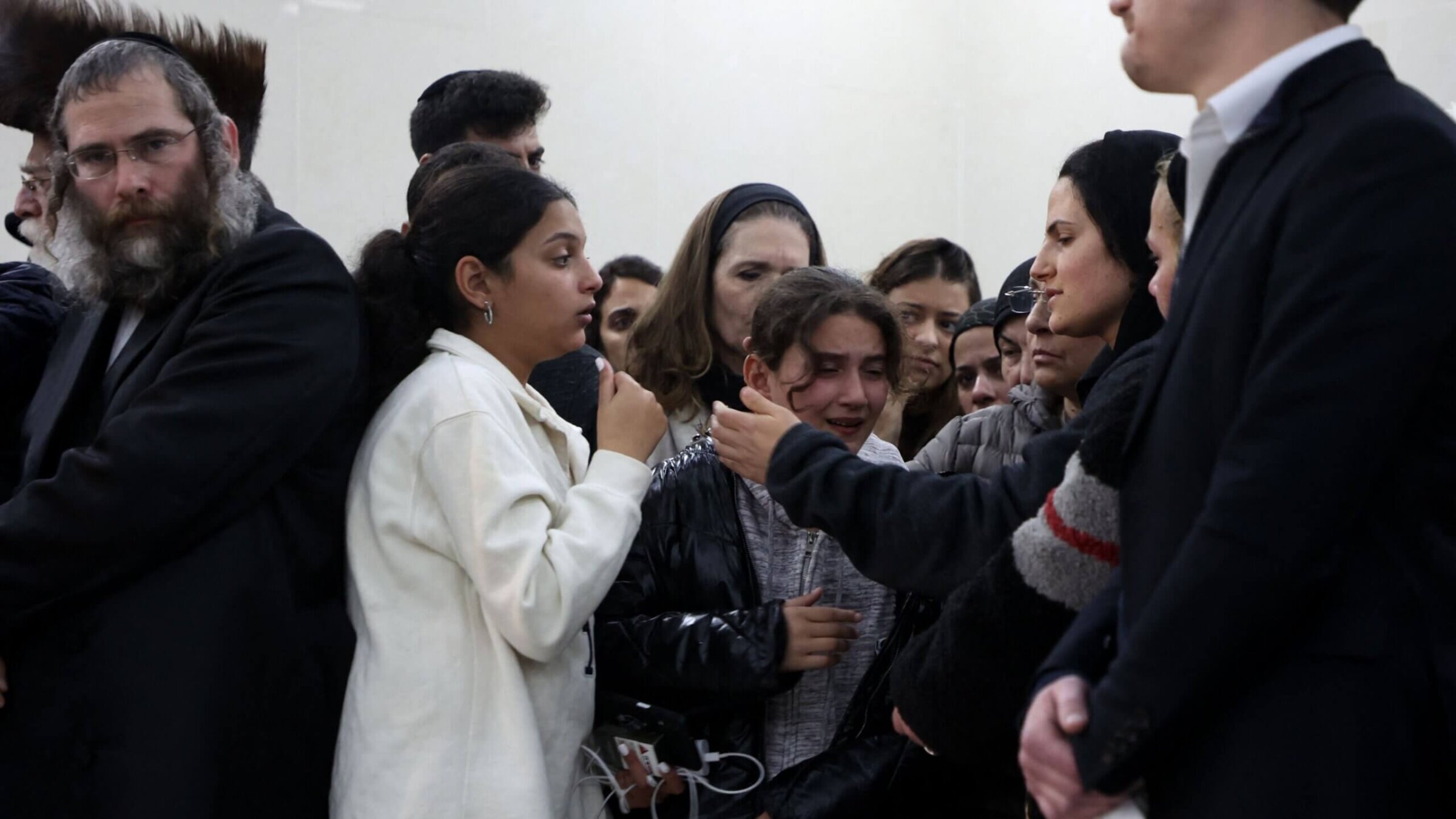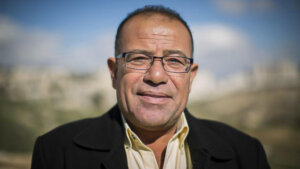After massacre at Jerusalem synagogue, Palestinians must confront the violence in our culture
Scenes of Palestinians and their supporters celebrating show something is ‘deeply broken’

Relatives and friends mourn during the funeral of 14-year-old Asher Natan, a victim of the shooting attack in east Jerusalem. Photo by GIL COHEN-MAGEN/AFP via Getty Images
Even more shocking than Friday night’s massacre outside an East Jerusalem synagogue is that this assault on civilians peacefully praying in a sacred space has been not condemned but celebrated by Palestinians and their purported admirers as far away as Yemen.
There is something deeply broken in a Palestinian street culture that honors violence against innocents, a culture in which some were filmed dancing in the streets and handing out candies after the 9/11 terror attacks. It is this: Multiple generations of Palestinian young people have been taught to hate Jews and Israel’s allies, and to equate attacks on civilians to attacks on military targets.
Too much of the Western world has coddled this perverse cycle. Enough is enough. Palestinians and all those who truly support us must stand for humanity.
There are ominous signs that the forces of cruelty are already on the brink of dragging the Palestinian people and our neighbors through another round of terrible conflict. Friday’s shooting outside the synagogue came a day after an Israeli commando raid on an apartment building in the Jenin refugee camp targeting a Palestinian Islamic Jihad cell that was reportedly on the verge of launching a major terrorist attack.
Israeli forces killed nine people in the raid, including seven men who Israeli and Palestinian officials said were armed. Militants in Gaza fired rockets at Israel in response. Then came the shooting that killed five men and two women outside the synagogue. Hours later, on Saturday morning, a 13-year-old Palestinian shot and wounded a father and his adult son outside Jerusalem’s Old City.
All humanity should recognize the difference between a preventative assault on a terrorist cell and the massacre of civilians in a house of worship. Yet Palestinian culture has somehow come to tolerate such chilling slaughter. It happened in 1972, after the murder of Israeli athletes at the Munich Olympics, and in 1976, with the plane hijacking to Entebbe, and so many times since.
Palestinians have been used as pawns by surrounding Arab nations that were pursuing a policy of eternal conflict with Israel. Most Arab countries refused citizenship to Palestinian refugees of the 1948 and 1967 wars in Israel, leaving us crowded in squalid camps, to maximize the pitifulness of our plight for the world media.
I should know. I was born in the Old City when it was under Jordanian rule. My family is Muslim, but we lived in the Jewish Quarter. Until 1966, when I was 8, and the Jordanian government forcibly relocated us to the Shuafat Refugee Camp, thus turning me and my family into “refugees.”
One must understand the refugee-ization of the Palestinian people to understand what has perverted our sons’ and daughters’ sense of humanity until they consider a mass shooting an occasion for sweets and dancing.
A Palestinian refugee is not just a refugee for life: Unlike all other refugee populations, the United Nations has given Palestinian refugees the unique curse of inheritability, so that there are now Palestinian refugees of the fourth and fifth generations.
This is how the number of Palestinians considered refugees registered with the United Nations Relief and Works Agency (UNWRA) ballooned from about 700,000 in 1948 — comparable to the 900,000 Jews who were expelled from Arab and Islamic countries in the same period — to an astonishing 5.6 million today.
UNRWA, which runs schools in the refugee camps, including much of the Gaza Strip, has contributed to the sick street culture with antisemitic education materials that include descriptions of Jews as “ impure” and “inherently treacherous and hostile to Islam and Muslims.” The materials accuse Jews of attempting to murder the Prophet Mohammad and “defiling” the Al-Aqsa Mosque.
Another factor is the lack of leadership and democratic processes in the Palestinian government. The supposed moderate, President Mahmoud Abbas, is now serving the 19th year of a four-year term. Contesting him are Hamas, whose charter covenant calls for Israel’s destruction, and PIJ, an Iranian proxy that rains rockets on Israeli cities.
Speaking of Iran, the country’s Tasnim News, which is considered close to the Islamic Revolutionary Guard Corps, broadcast a glowing account of Friday’s synagogue massacre, calling the perpetrator a “martyr” and reporting that Iranian-allied forces in Yemen had “blessed” the attacker. It’s no wonder that the toxic milieu of Palestinian politics has given rise to the ugly Boycott, Divestment, and Sanctions (BDS) concept, which opposes peace between Israelis and Palestinian and calls instead for the total destruction of the state of Israel.
It’s time to admit that Palestinian institutions are broken, and that they have developmentally harmed generations of Palestinian men and women, boys and girls, by whipping them into a constant froth with violently antisemitic educational and media content that celebrate “martyrdom” attacks against Israelis.
The Palestinian Authority provides a financial incentive for terrorism by providing pensions to the families of those who attack Israelis. Hamas has created a smaller Taliban in its private emirate in Gaza, and Iran’s malign influence is running amok via its puppets at the PIJ.
It took years to fix societies that had been abused by the Nazis, who began to corrupt young people in early childhood with cult-inculcation organizations like the Hitler Youth and Bund Deutscher Mädel, and the similarly militant culture of wartime Japan, which had an equivalent youth-brainwashing organization called the Great Japan Youth Party.
The Palestinian people’s immersion in a culture of violence now spans generations. The corrupt Palestinian institutions must be completely abolished, and an entirely new framework envisioned so that a rising generation can mature and embrace the prospects of peace and prosperity.

















